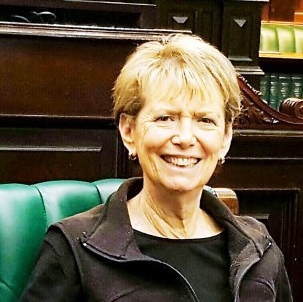click to dowload our latest edition
CLICK HERE TO SUBSCRIBE TO OUR NEWSLETTER


Published
6 years agoon
By
adminMOIRA SCHNEIDER
When Miller was told by a colleague to present herself at Parliament last Tuesday, she had no idea what was in store for her. “When I got there and heard that Michael Bagraim was going to speak about me and Mosaic, I was shocked!” she recalls.
Democratic Alliance MP Bagraim, who is the shadow minister of labour, introduced a motion without notice which was passed unanimously. “I hereby move that this House… recognises the outstanding contribution made by Rolene Miller in the establishment (of Mosaic) and the enormous amount of work that she has done in ensuring that women from the disadvantaged communities have access to protection, advice and shelter from the situations they find themselves in,” it read in part.
The motion also called on Parliament to recognise “the outstanding contribution made by Rolene Miller to the development of advocacy for women and girls’ rights and health issues in South Africa”.
It all started in 1993 when Miller, a social worker, remedial teacher and Lifeline counsellor, founded Mosaic for the specific purpose of preventing and reducing abuse and domestic violence, particularly for women and youth living in disadvantaged communities. Mosaic’s main objectives include increased availability and accessibility to high quality, integrated services for survivors of the twin scourges.
The focus of the organisation has always been to educate people about abuse and gender-based violence, to run workshops, support groups and to counsel women who are abused. The name Mosaic is symbolic of women putting the broken pieces of their lives together to create beautiful lives for themselves, Miller explains.
“I realised that there were no services for abused women in the underprivileged areas,” she remembers of those early days. “Our motto was that we don’t work behind closed doors, we go out into the community to meet them where they are.
“So, we went to hospitals, to clinics, to schools, to churches, to community meetings and we educated people about abuse.” Miller and psychologist Tammy Shaffer compiled a course and in 1995 started training 28 women from targeted areas in social work skills, who then delivered services for abused women in 33 communities.
“These were grassroots women who could just about understand English and the technicalities and jargon had to be explained to them – it wasn’t easy for them or me, but they came out victorious,” she says. Most of them remain community workers, whether social auxiliary workers, court workers or counsellors – today there are 70 members of staff.
In the course of their duties, community workers brought their clients who needed protection orders (from domestic violence) to court. “There was nobody who could speak Xhosa (there) and the protection orders were written in English and Afrikaans,” Miller relates.
“So, our community workers translated for them, wrote their affidavits for them and helped them to apply for the protection order.” But this was keeping them from their other duties, so Mosaic decided to train dedicated court workers in court procedure and rights – 42 have qualified over the years and they work in 14 courts in the Western Cape and two in Gauteng, including accompanying the often terrified women who have to testify against the accused.
The court support model is implemented in partnerships in the Eastern Cape, Northern Cape and KwaZulu-Natal.
Bagraim says that Miller has made it easier for women to come forward in rape cases. “In this country, approximately five per cent of rapes are reported because women can’t go through with it.
“What Mosaic does is firstly, boost their confidence. They speak to the prosecutors to let them know that the women will be kept outside the court room until they are needed.
“They ensure that the prosecutors go through with the court case. They also convince women to come forward if they are abused and not just to take it for the rest of their lives.”
Mosaic is unique in that it was the first organisation in the Western Cape to start working with domestic violence complaints directly at the courts in 1999; in this regard, thousands have been assisted over the years. In addition, Miller ran support groups for the clerks of the courts.
The organisation later increased its offering and began training men and male youths “because we wanted to stop abuse from the source, from men who abuse women”, Miller states. It presently provides services to abused women, men and youth.
Miller was executive director of Mosaic from its foundation in 1993 until 2005 and today remains an active member of its board. Mosaic Training Services and Healing Centre now has a donor-funded head office in Wynberg as well as satellite offices, a far cry from those early days when community workers counselled individuals in purple containers.
Miller funded the organisation personally until it received a grant from the Department of Social Development in mid-1997. “I remember I was ecstatic – they gave us R142 000 and to me this was an enormous amount because we had nothing before.
“When I did the training of the second group of community workers (1996) we were bankrupt – a lot of them had to leave and it was very hard for us. We were always two months away from bankruptcy,” she remembers, so the funding and some small donations came as a relief.
Trainees’ comments at the end of their abuse training sum it up best: “Lots of women are not aware of abuse. Sometimes they keep quiet… This workshop is empowering women to know what to do if they are abused. It is opening the eyes of women,” writes one participant.
Says another: “Keep it up Mosaic. All women must be aware and stand up for their rights. If you educate or make women aware, you educate a nation. I also thank you, you bring the light. I was in a dark place.”
